Leadership Management Report: Contemporary Issues and Practices
VerifiedAdded on 2022/08/21
|7
|861
|10
Report
AI Summary
This report comprehensively examines leadership management, focusing on instructional and transformational leadership. It analyzes the leadership practices of a school head, identifying challenges and suggesting improvements, with a focus on expectation and goals, teacher development, and collaboration. The report conceptualizes educational leadership, differentiates it from management, and explores the application of transformational leadership to address contemporary issues. It also reflects on findings from an article on rural school leadership challenges, particularly in the Solomon Islands, and discusses the implications of decolonizing dominant Western processes, referencing the impact of European colonialism on postcolonial states and academic attention, along with relevant examples and literature.
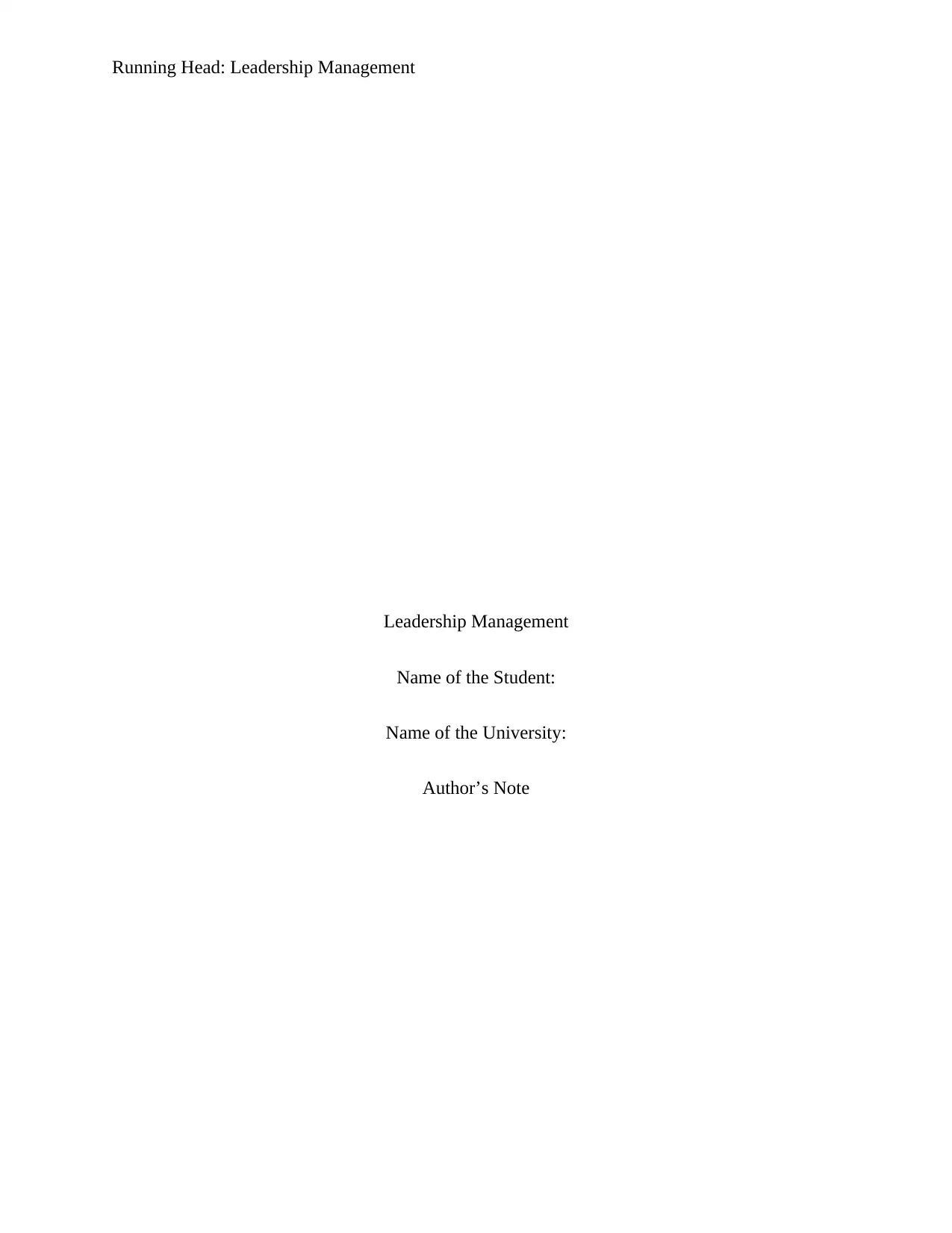
Running Head: Leadership Management
Leadership Management
Name of the Student:
Name of the University:
Author’s Note
Leadership Management
Name of the Student:
Name of the University:
Author’s Note
Paraphrase This Document
Need a fresh take? Get an instant paraphrase of this document with our AI Paraphraser
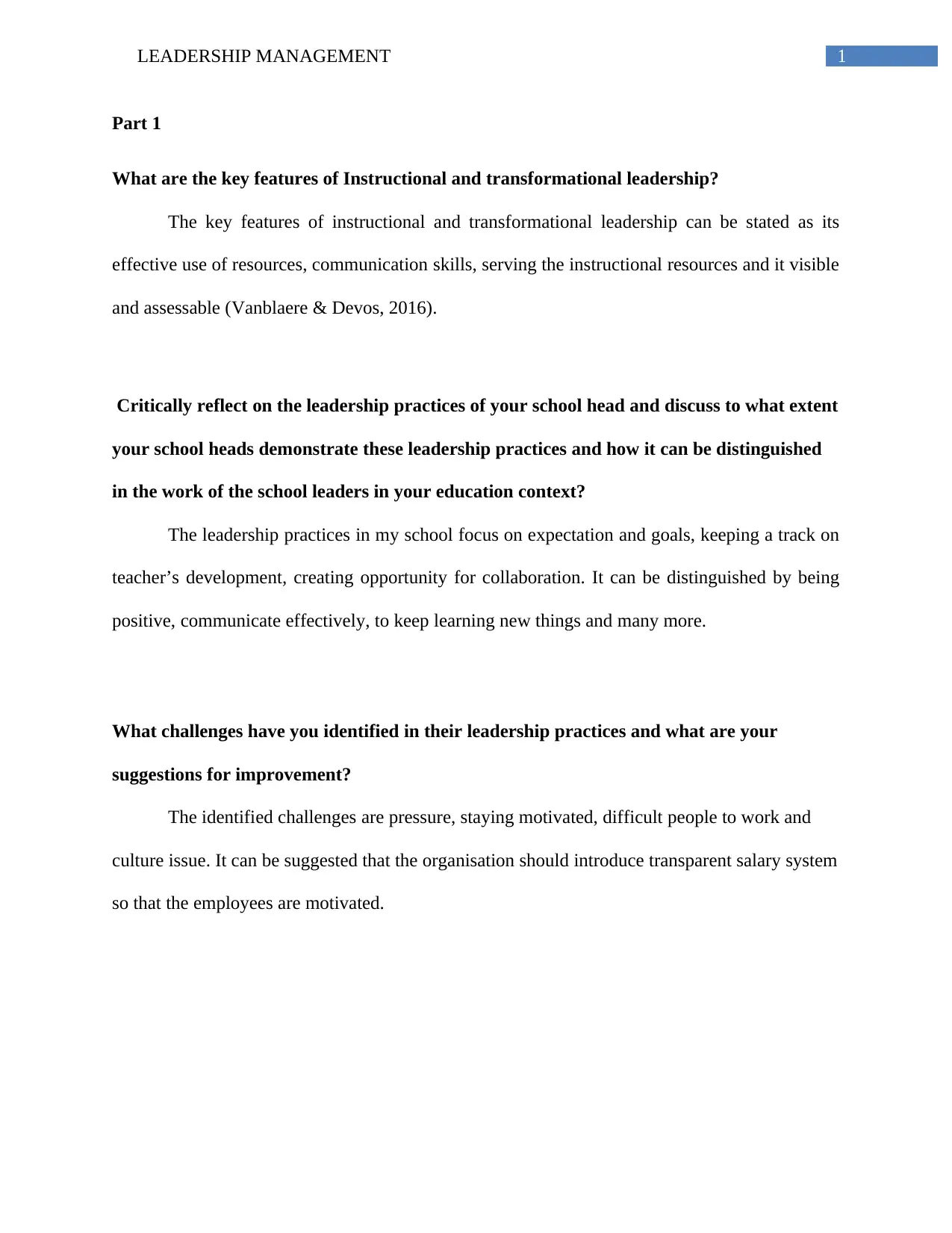
1LEADERSHIP MANAGEMENT
Part 1
What are the key features of Instructional and transformational leadership?
The key features of instructional and transformational leadership can be stated as its
effective use of resources, communication skills, serving the instructional resources and it visible
and assessable (Vanblaere & Devos, 2016).
Critically reflect on the leadership practices of your school head and discuss to what extent
your school heads demonstrate these leadership practices and how it can be distinguished
in the work of the school leaders in your education context?
The leadership practices in my school focus on expectation and goals, keeping a track on
teacher’s development, creating opportunity for collaboration. It can be distinguished by being
positive, communicate effectively, to keep learning new things and many more.
What challenges have you identified in their leadership practices and what are your
suggestions for improvement?
The identified challenges are pressure, staying motivated, difficult people to work and
culture issue. It can be suggested that the organisation should introduce transparent salary system
so that the employees are motivated.
Part 1
What are the key features of Instructional and transformational leadership?
The key features of instructional and transformational leadership can be stated as its
effective use of resources, communication skills, serving the instructional resources and it visible
and assessable (Vanblaere & Devos, 2016).
Critically reflect on the leadership practices of your school head and discuss to what extent
your school heads demonstrate these leadership practices and how it can be distinguished
in the work of the school leaders in your education context?
The leadership practices in my school focus on expectation and goals, keeping a track on
teacher’s development, creating opportunity for collaboration. It can be distinguished by being
positive, communicate effectively, to keep learning new things and many more.
What challenges have you identified in their leadership practices and what are your
suggestions for improvement?
The identified challenges are pressure, staying motivated, difficult people to work and
culture issue. It can be suggested that the organisation should introduce transparent salary system
so that the employees are motivated.
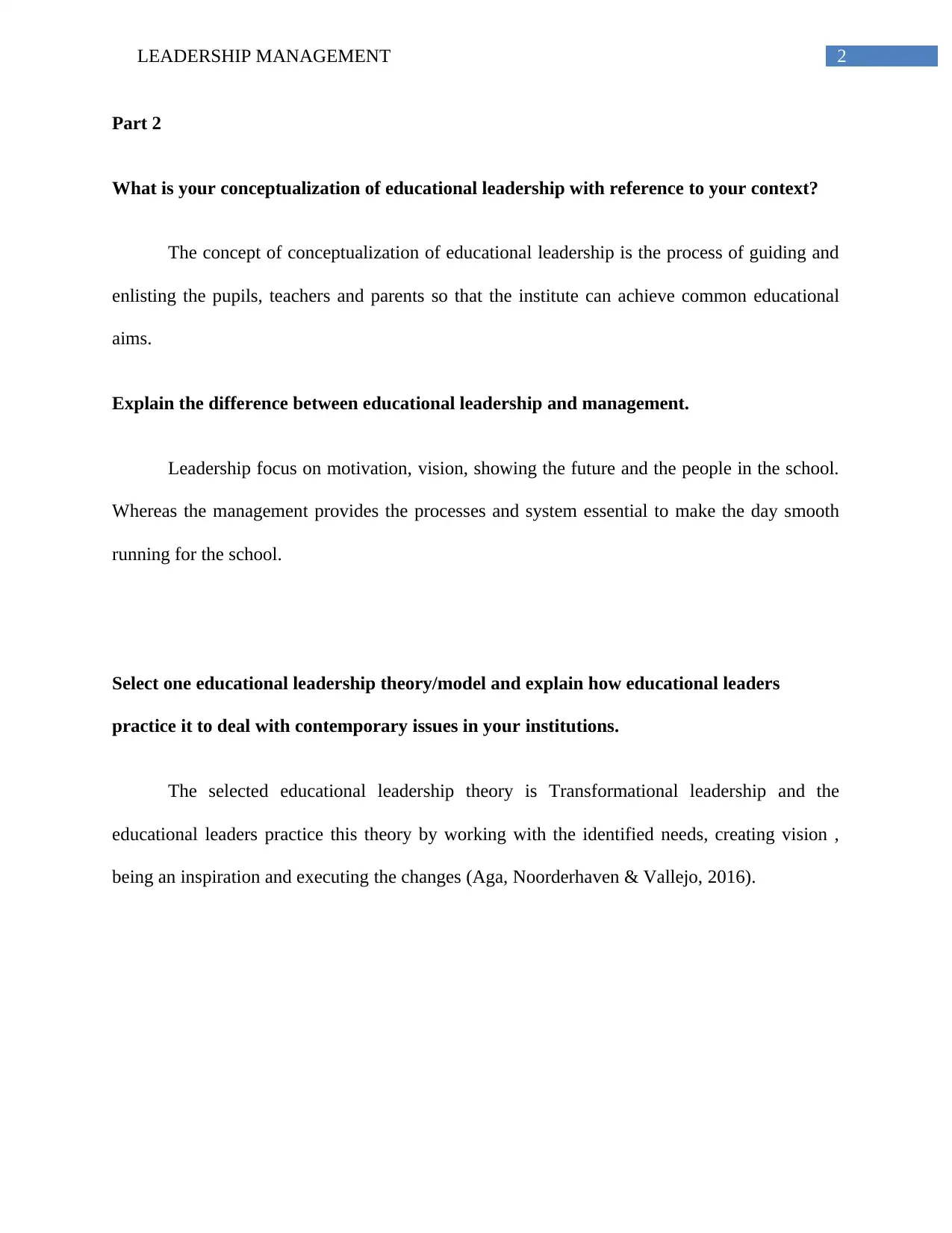
2LEADERSHIP MANAGEMENT
Part 2
What is your conceptualization of educational leadership with reference to your context?
The concept of conceptualization of educational leadership is the process of guiding and
enlisting the pupils, teachers and parents so that the institute can achieve common educational
aims.
Explain the difference between educational leadership and management.
Leadership focus on motivation, vision, showing the future and the people in the school.
Whereas the management provides the processes and system essential to make the day smooth
running for the school.
Select one educational leadership theory/model and explain how educational leaders
practice it to deal with contemporary issues in your institutions.
The selected educational leadership theory is Transformational leadership and the
educational leaders practice this theory by working with the identified needs, creating vision ,
being an inspiration and executing the changes (Aga, Noorderhaven & Vallejo, 2016).
Part 2
What is your conceptualization of educational leadership with reference to your context?
The concept of conceptualization of educational leadership is the process of guiding and
enlisting the pupils, teachers and parents so that the institute can achieve common educational
aims.
Explain the difference between educational leadership and management.
Leadership focus on motivation, vision, showing the future and the people in the school.
Whereas the management provides the processes and system essential to make the day smooth
running for the school.
Select one educational leadership theory/model and explain how educational leaders
practice it to deal with contemporary issues in your institutions.
The selected educational leadership theory is Transformational leadership and the
educational leaders practice this theory by working with the identified needs, creating vision ,
being an inspiration and executing the changes (Aga, Noorderhaven & Vallejo, 2016).
⊘ This is a preview!⊘
Do you want full access?
Subscribe today to unlock all pages.

Trusted by 1+ million students worldwide
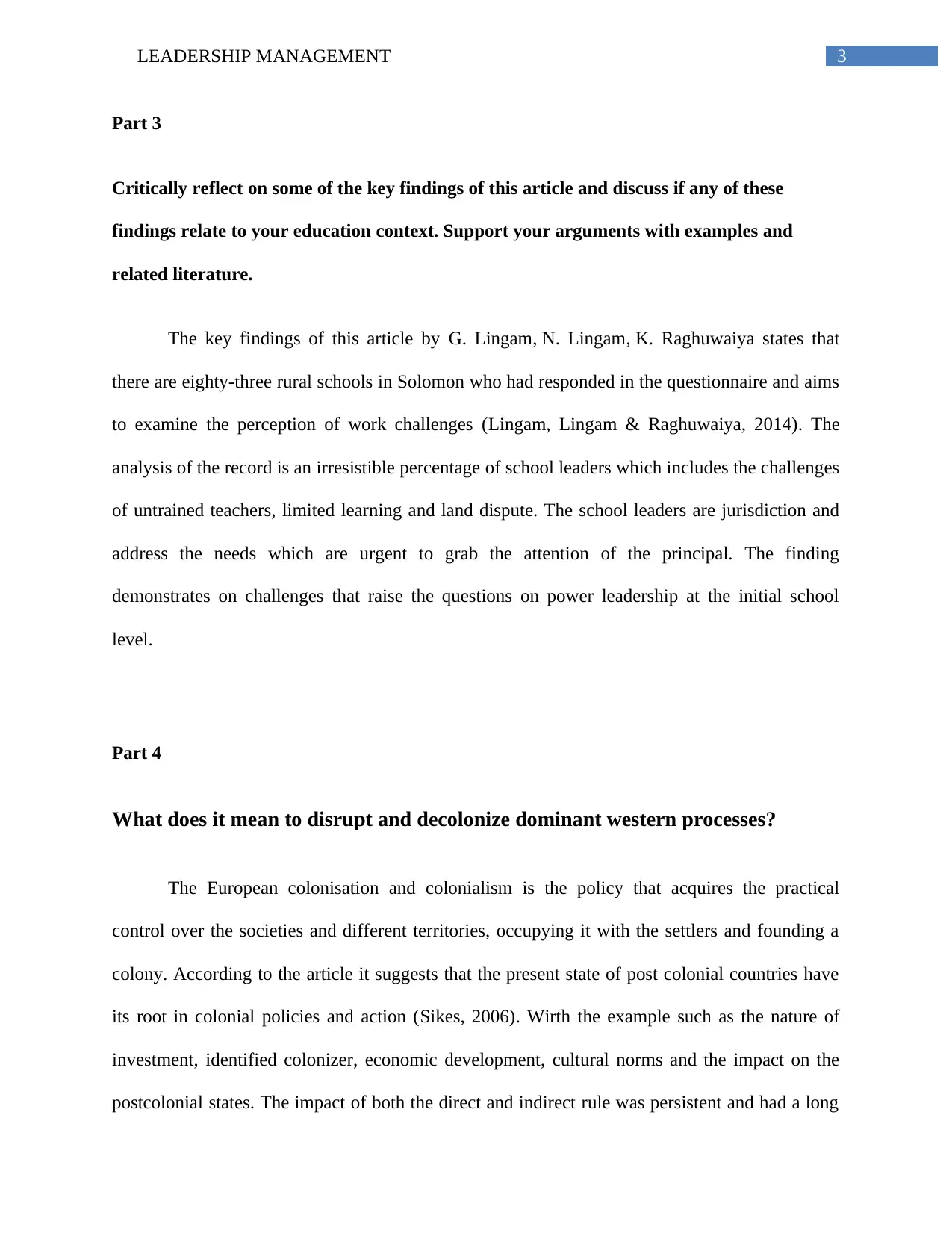
3LEADERSHIP MANAGEMENT
Part 3
Critically reflect on some of the key findings of this article and discuss if any of these
findings relate to your education context. Support your arguments with examples and
related literature.
The key findings of this article by G. Lingam, N. Lingam, K. Raghuwaiya states that
there are eighty-three rural schools in Solomon who had responded in the questionnaire and aims
to examine the perception of work challenges (Lingam, Lingam & Raghuwaiya, 2014). The
analysis of the record is an irresistible percentage of school leaders which includes the challenges
of untrained teachers, limited learning and land dispute. The school leaders are jurisdiction and
address the needs which are urgent to grab the attention of the principal. The finding
demonstrates on challenges that raise the questions on power leadership at the initial school
level.
Part 4
What does it mean to disrupt and decolonize dominant western processes?
The European colonisation and colonialism is the policy that acquires the practical
control over the societies and different territories, occupying it with the settlers and founding a
colony. According to the article it suggests that the present state of post colonial countries have
its root in colonial policies and action (Sikes, 2006). Wirth the example such as the nature of
investment, identified colonizer, economic development, cultural norms and the impact on the
postcolonial states. The impact of both the direct and indirect rule was persistent and had a long
Part 3
Critically reflect on some of the key findings of this article and discuss if any of these
findings relate to your education context. Support your arguments with examples and
related literature.
The key findings of this article by G. Lingam, N. Lingam, K. Raghuwaiya states that
there are eighty-three rural schools in Solomon who had responded in the questionnaire and aims
to examine the perception of work challenges (Lingam, Lingam & Raghuwaiya, 2014). The
analysis of the record is an irresistible percentage of school leaders which includes the challenges
of untrained teachers, limited learning and land dispute. The school leaders are jurisdiction and
address the needs which are urgent to grab the attention of the principal. The finding
demonstrates on challenges that raise the questions on power leadership at the initial school
level.
Part 4
What does it mean to disrupt and decolonize dominant western processes?
The European colonisation and colonialism is the policy that acquires the practical
control over the societies and different territories, occupying it with the settlers and founding a
colony. According to the article it suggests that the present state of post colonial countries have
its root in colonial policies and action (Sikes, 2006). Wirth the example such as the nature of
investment, identified colonizer, economic development, cultural norms and the impact on the
postcolonial states. The impact of both the direct and indirect rule was persistent and had a long
Paraphrase This Document
Need a fresh take? Get an instant paraphrase of this document with our AI Paraphraser
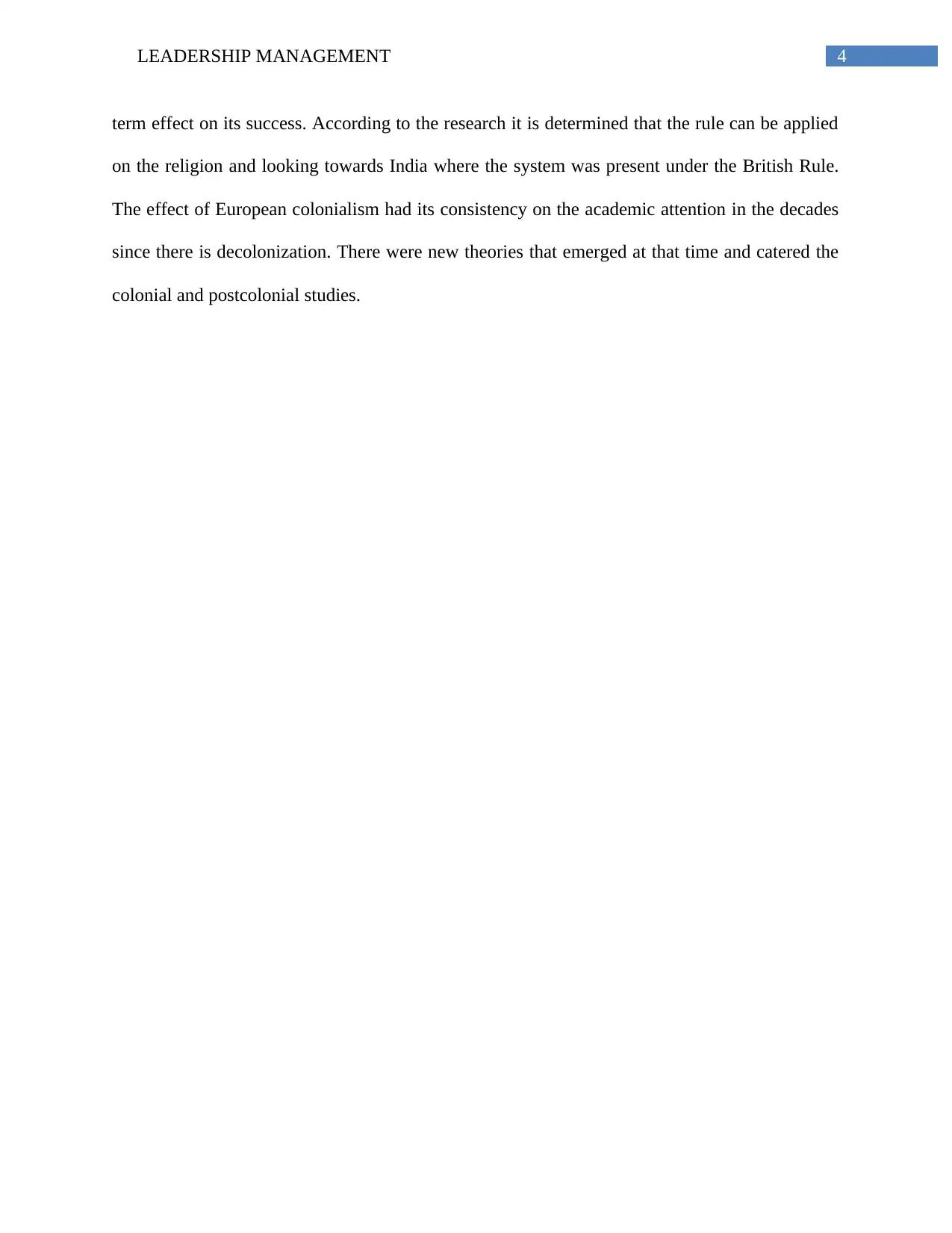
4LEADERSHIP MANAGEMENT
term effect on its success. According to the research it is determined that the rule can be applied
on the religion and looking towards India where the system was present under the British Rule.
The effect of European colonialism had its consistency on the academic attention in the decades
since there is decolonization. There were new theories that emerged at that time and catered the
colonial and postcolonial studies.
term effect on its success. According to the research it is determined that the rule can be applied
on the religion and looking towards India where the system was present under the British Rule.
The effect of European colonialism had its consistency on the academic attention in the decades
since there is decolonization. There were new theories that emerged at that time and catered the
colonial and postcolonial studies.
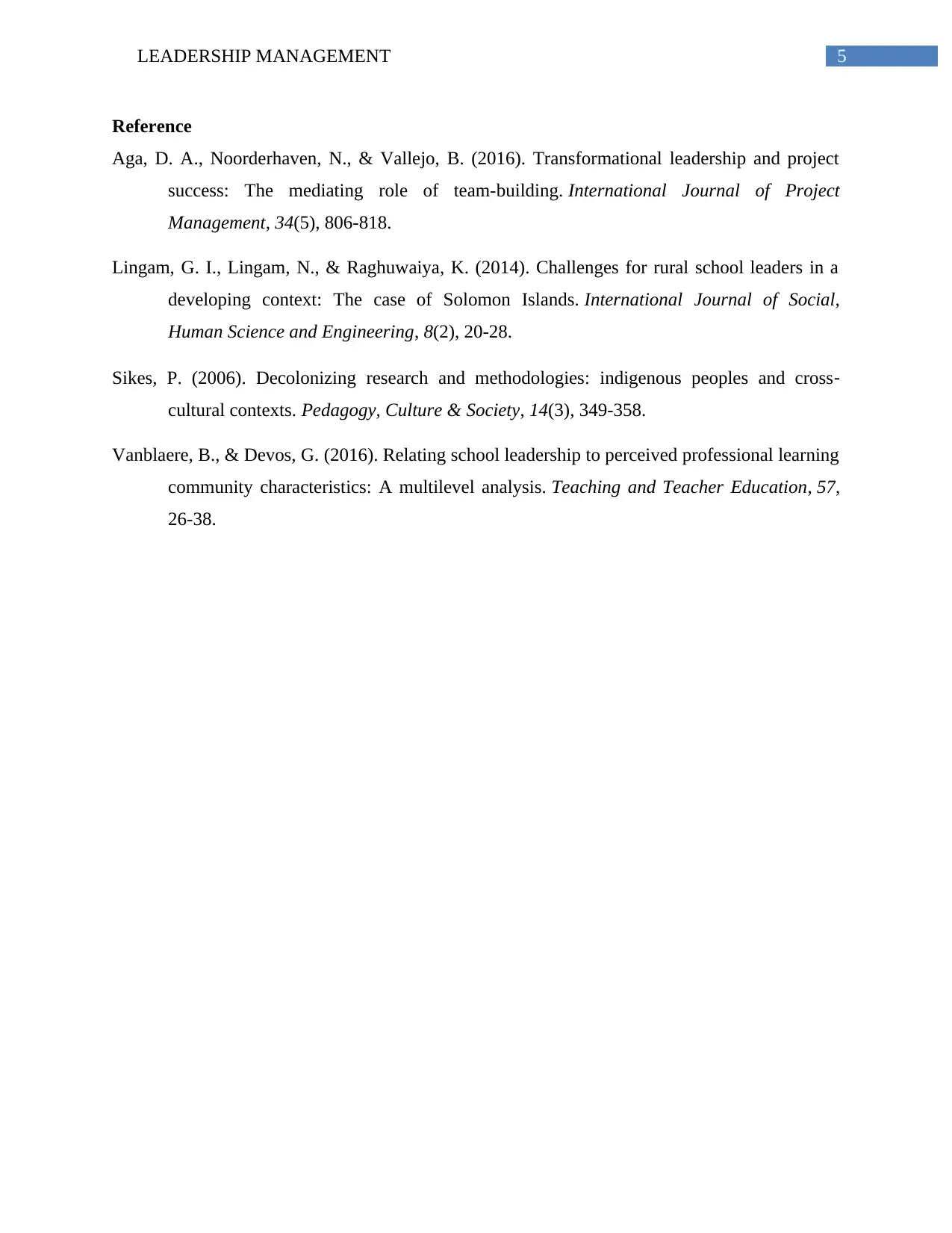
5LEADERSHIP MANAGEMENT
Reference
Aga, D. A., Noorderhaven, N., & Vallejo, B. (2016). Transformational leadership and project
success: The mediating role of team-building. International Journal of Project
Management, 34(5), 806-818.
Lingam, G. I., Lingam, N., & Raghuwaiya, K. (2014). Challenges for rural school leaders in a
developing context: The case of Solomon Islands. International Journal of Social,
Human Science and Engineering, 8(2), 20-28.
Sikes, P. (2006). Decolonizing research and methodologies: indigenous peoples and cross‐
cultural contexts. Pedagogy, Culture & Society, 14(3), 349-358.
Vanblaere, B., & Devos, G. (2016). Relating school leadership to perceived professional learning
community characteristics: A multilevel analysis. Teaching and Teacher Education, 57,
26-38.
Reference
Aga, D. A., Noorderhaven, N., & Vallejo, B. (2016). Transformational leadership and project
success: The mediating role of team-building. International Journal of Project
Management, 34(5), 806-818.
Lingam, G. I., Lingam, N., & Raghuwaiya, K. (2014). Challenges for rural school leaders in a
developing context: The case of Solomon Islands. International Journal of Social,
Human Science and Engineering, 8(2), 20-28.
Sikes, P. (2006). Decolonizing research and methodologies: indigenous peoples and cross‐
cultural contexts. Pedagogy, Culture & Society, 14(3), 349-358.
Vanblaere, B., & Devos, G. (2016). Relating school leadership to perceived professional learning
community characteristics: A multilevel analysis. Teaching and Teacher Education, 57,
26-38.
⊘ This is a preview!⊘
Do you want full access?
Subscribe today to unlock all pages.

Trusted by 1+ million students worldwide
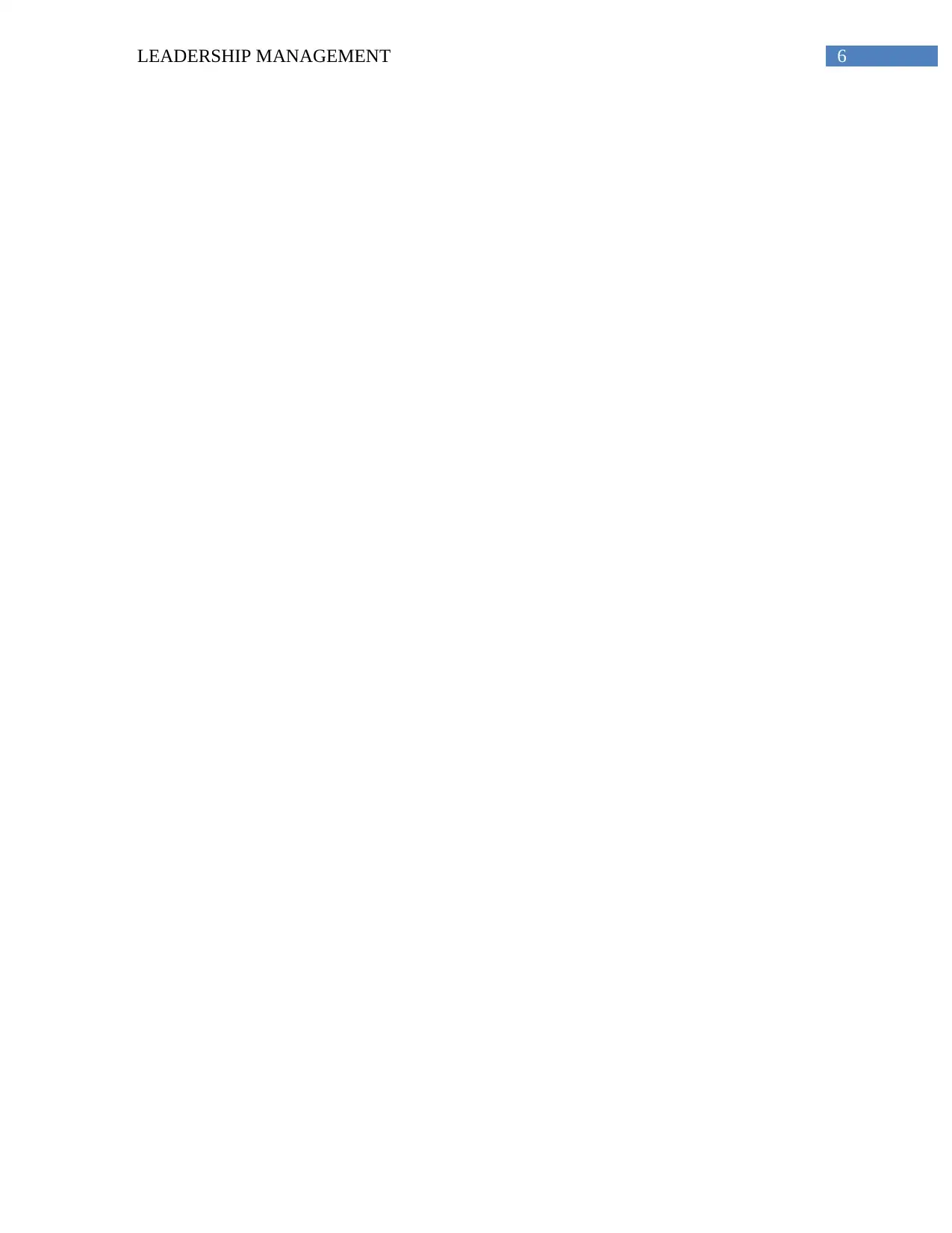
6LEADERSHIP MANAGEMENT
1 out of 7
Related Documents
Your All-in-One AI-Powered Toolkit for Academic Success.
+13062052269
info@desklib.com
Available 24*7 on WhatsApp / Email
![[object Object]](/_next/static/media/star-bottom.7253800d.svg)
Unlock your academic potential
Copyright © 2020–2026 A2Z Services. All Rights Reserved. Developed and managed by ZUCOL.





